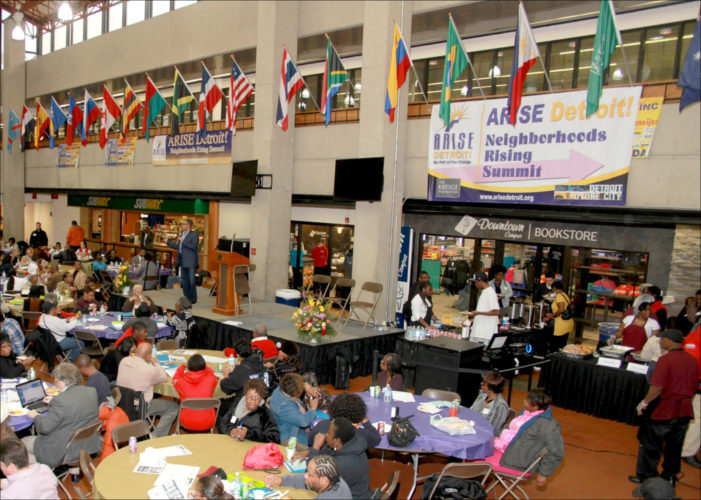It’s not the most ordinary landscape for development.
From east to west, Detroit communities are diverse not only in their residential makeup, but in their depth of economic and professional resources.
The various obstacles faced by neighborhoods envisioning assets that would enhance their quality of life is an ongoing discussion in the city. Although developers must respect and collaborate with residents for greater mutual progress, experts say it’s equally important that residents prepare themselves and their neighbors to properly embrace development.
“Given funding, predominantly black neighborhoods have the skills and intellect to create major city assets on par with those of Dan Gilbert and the late Mike Ilitch.” -Marvin Beatty, Principal, Magic Plus, LLC
Organized by ARISE Detroit!, a recent panel at Wayne County Community College District’s downtown campus examined how neighborhood groups can better align their needs with the goals of developers.
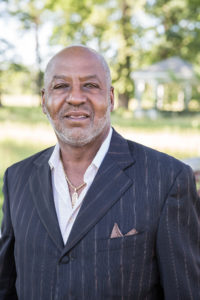
Describing capital as “the barrier that precludes us from development in our community,” Marvin Beatty, principal partner in Magic Plus, LLC, told the audience financial institutions must be more willing to invest in neighborhoods of color. Beatty, who co-developed the thriving Gateway Marketplace shopping plaza at Eight Mile Road and Woodward Avenue, envisions similar success with his partners at the nearby site of the former State Fairgrounds, where there are plans for affordable housing, retail and educational outlets. Given funding, he says, predominantly black neighborhoods have the skills and intellect to create major city assets on par with those of Dan Gilbert and the late Mike Ilitch.
“But if we don’t have the same access we will not have the same opportunity,” Beatty added.
Gateway Marketplace anchors Meijer, Marshall’s and Petco have proven that Detroit is a great business, according to Beatty, who says that the three chains report that the Gateway stores are their highest revenue producing units in the U.S.
Jackie Berg, publisher of TheHUB, who co-moderated the panel with Mark S. Lee, host of the CBS Radio show “Small Talk with Mark S. Lee, asked the panel how neighborhoods can leverage capacity once it’s achieved.
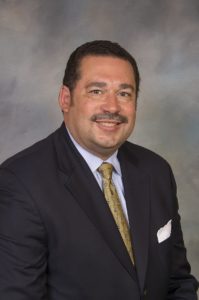
“The best way to build capacity is to partner with capacity,” said Douglass Diggs, CEO of The Diggs Group, “…make sure you partner in a way that does not lead to dependence, but leads to opportunity to grow capacity independently.”
Diggs’ development company helped construct the new Little Caesars Arena. Neighborhood-based groups collaborating with corporate partners can learn enough from the development process to put themselves in better positions for growth, even gaining the status of “multi-million-dollar non-profit” to create affordable housing or more, he said.
Beatty echoed the need for residents and grassroots visionaries to navigate the learning curve of community development.
“If you don’t understand how to do business and you are also working with people who don’t know how to do business and are struggling to understand how to do business, it becomes more and more of a challenge,” Beatty said.
Pam Martin Turner, executive director of Vanguard Community Development Corp., which develops affordable housing in Detroit’s North End, encouraged residents to take training courses, consult experts on neighborhood equity, and establish dialogue. Residents and developers shouldn’t be afraid to discuss race and opportunity for people of color, which can serve common goals, Martin Turner said.
“It’s not playing the race card. There is no race card,” she said.
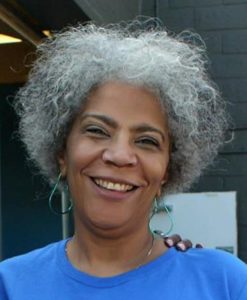
Accomplishments, like the significant increase of housing Vanguard CDC has achieved during the course of about 25 years, are realistic for other organizations, she said. Tens of millions of dollars in real estate is part of Vanguard’s portfolio, she added: “We did it and we aren’t special.”
Jeff Jones, director of community organizing for Doing Development Differently in Detroit (D4), quoted reports of an anticipated $6 billion in investment the city will receive in the next five years. D4 represents a collaborative of labor, skilled trade, environmental and other social justice organizations that share the goal of creating more equitable development.
“We believe development is better for Detroit when Detroit actually sees some benefits,” he said.
“We can’t wait on outside resources,” Jones added. “We have to put pressure on the businesses, on our leaders, on our neighbors, to make sure development is done differently in the city of Detroit.”
Jones, who lives in what he describes as modest, west side neighborhood where people have to “roll up their sleeves” and get directly involved with projects that impact them, recommends preparation. As early as junior high youth should be exposed to work readiness initiatives, skilled trade opportunity, and career options that build neighborhoods’ capacity for gain, he added. Electricians, carpenters and other skilled tradesman should be recruited from the same neighborhoods where development takes place, panelists agreed.
“There’s more opportunity in the neighborhoods than there will ever be in downtown Detroit.” –Douglass Diggs, CEO , The Diggs Group
Anika Goss-Foster, executive director of Detroit Future City, recommended local job readiness programs like Flip the Script and Goodwill Industries for residents who want to ready themselves for the work force.
Diggs also stressed the need for training.
“Whether it’s a house or an arena,” he said, “we need to have the skills to complete that.”
“There’s more opportunity in the neighborhoods than there will ever be in downtown Detroit,” he added.
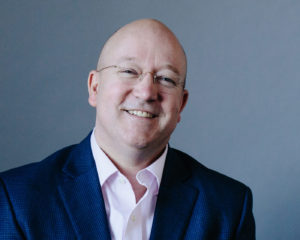
Dietrich Knoer, president and CEO of The Platform, quoted a Detroit Economic Growth Corp.-supported study that estimates $2.6 billion in purchasing power flows out of Detroit annually.
“It’s really…the first time I heard a numerical, a statistical summary of the fact that the city is grossly underserved,” he said. “There just aren’t enough amenities to service all the people that live here.”
Commercial corridors like Gratiot, McNichols, and Grand River once boasted “shop after shop after shop,” Knoer added, stressing the need for new small businesses.
“Retail has to come back in. We’re all desperately hungry for it,” he said.
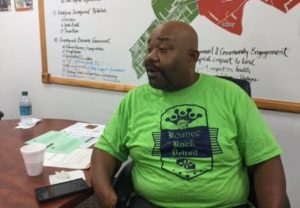
While many residents have expressed resentment about signs of investment outside their communities, Martin Turner stressed that it’s incumbent on neighborhoods to support their non-profits and organize for their growth.
“Development is not a bad word and making money is not a bad thing,” she said.
Greater commitment to spending money within the neighborhood and being more supportive of local businesses also strengthens community investment, Beatty said. Character is also key to the equation, added Martin Turner.
“All it takes is time and energy, perseverance and determination, and you have that,” she told the audience. “And you know why I know you have that? Because you’re from the D.”
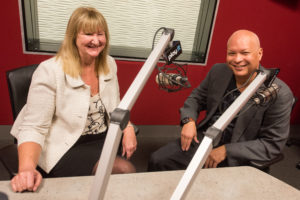
Detroit residents are ready for growth, according to Berg, who noted that TheHUB’s exclusive neighborhood development mapping project has identified more than $597.3-million neighborhood investments in Detroit’s District 5, as well as $1.7-billion in investments in District 2.
TheHUB will be revealing its map of investments in Southwest Detroit’s (District 6) neighborhoods, which collectively top $6-billion later this month.
Co-moderator Mark S. Lee summed up the effort by stating, “Detroit’s neighborhoods will grow exponentially with more open dialogue and understanding between neighborhood groups and investors.”
Bottom line: Development is a two-way street.
Editor’s Note: The ARISE Detroit Neighborhood Rising Summit was sponsored by DTE Energy, The Kresge Foundation, and Detroit Future City.

